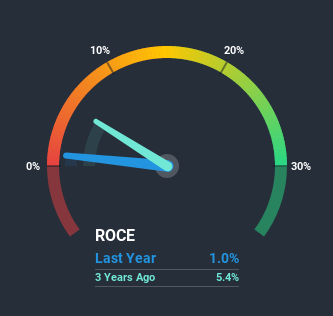- Japan
- /
- Specialty Stores
- /
- FKSE:3047
Should You Be Impressed By Truck-One's (FKSE:3047) Returns on Capital?

Did you know there are some financial metrics that can provide clues of a potential multi-bagger? One common approach is to try and find a company with returns on capital employed (ROCE) that are increasing, in conjunction with a growing amount of capital employed. Basically this means that a company has profitable initiatives that it can continue to reinvest in, which is a trait of a compounding machine. However, after investigating Truck-One (FKSE:3047), we don't think it's current trends fit the mold of a multi-bagger.
Understanding Return On Capital Employed (ROCE)
Just to clarify if you're unsure, ROCE is a metric for evaluating how much pre-tax income (in percentage terms) a company earns on the capital invested in its business. To calculate this metric for Truck-One, this is the formula:
Return on Capital Employed = Earnings Before Interest and Tax (EBIT) ÷ (Total Assets - Current Liabilities)
0.0099 = JP¥17m ÷ (JP¥4.4b - JP¥2.6b) (Based on the trailing twelve months to September 2020).
Thus, Truck-One has an ROCE of 1.0%. In absolute terms, that's a low return and it also under-performs the Specialty Retail industry average of 9.1%.
View our latest analysis for Truck-One

While the past is not representative of the future, it can be helpful to know how a company has performed historically, which is why we have this chart above. If you want to delve into the historical earnings, revenue and cash flow of Truck-One, check out these free graphs here.
What Does the ROCE Trend For Truck-One Tell Us?
When we looked at the ROCE trend at Truck-One, we didn't gain much confidence. To be more specific, ROCE has fallen from 8.8% over the last five years. On the other hand, the company has been employing more capital without a corresponding improvement in sales in the last year, which could suggest these investments are longer term plays. It's worth keeping an eye on the company's earnings from here on to see if these investments do end up contributing to the bottom line.
On a related note, Truck-One has decreased its current liabilities to 61% of total assets. So we could link some of this to the decrease in ROCE. What's more, this can reduce some aspects of risk to the business because now the company's suppliers or short-term creditors are funding less of its operations. Since the business is basically funding more of its operations with it's own money, you could argue this has made the business less efficient at generating ROCE. Keep in mind 61% is still pretty high, so those risks are still somewhat prevalent.What We Can Learn From Truck-One's ROCE
To conclude, we've found that Truck-One is reinvesting in the business, but returns have been falling. And investors may be recognizing these trends since the stock has only returned a total of 32% to shareholders over the last five years. So if you're looking for a multi-bagger, the underlying trends indicate you may have better chances elsewhere.
If you want to know some of the risks facing Truck-One we've found 4 warning signs (2 don't sit too well with us!) that you should be aware of before investing here.
While Truck-One may not currently earn the highest returns, we've compiled a list of companies that currently earn more than 25% return on equity. Check out this free list here.
When trading Truck-One or any other investment, use the platform considered by many to be the Professional's Gateway to the Worlds Market, Interactive Brokers. You get the lowest-cost* trading on stocks, options, futures, forex, bonds and funds worldwide from a single integrated account. Promoted
Valuation is complex, but we're here to simplify it.
Discover if Truck-One might be undervalued or overvalued with our detailed analysis, featuring fair value estimates, potential risks, dividends, insider trades, and its financial condition.
Access Free AnalysisThis article by Simply Wall St is general in nature. It does not constitute a recommendation to buy or sell any stock, and does not take account of your objectives, or your financial situation. We aim to bring you long-term focused analysis driven by fundamental data. Note that our analysis may not factor in the latest price-sensitive company announcements or qualitative material. Simply Wall St has no position in any stocks mentioned.
*Interactive Brokers Rated Lowest Cost Broker by StockBrokers.com Annual Online Review 2020
Have feedback on this article? Concerned about the content? Get in touch with us directly. Alternatively, email editorial-team@simplywallst.com.
About FKSE:3047
Truck-One
Operates as a dealer of used vehicles in Japan and internationally.
Solid track record established dividend payer.
Market Insights
Community Narratives




